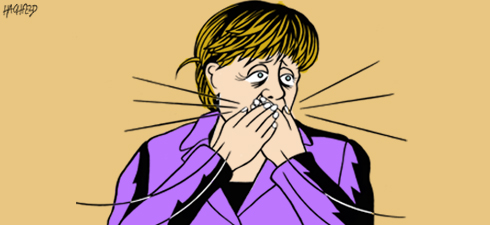The five upcoming elections will change the country dramatically. The first will be the two state elections in the north and west of Germany, in Schleswig-Holstein and North Rhine-Westphalia, which will decide whether the most popular German politician and the strongest politician in Europe still has a hope of holding onto power.
At least as important for Germany will be the election on Sunday in Greece. A great deal of political energy and even more money has been invested in helping Greece help itself. If the Greeks now put together a parliament whose majority sets itself against the austerity measures and the rehabilitation of the country, the whole European Union deal with Greece could be sunk. Economically that might be overcome in the meanwhile, but the legitimacy of more bail-outs for other European countries would take a substantial buffeting.
Merkel's European policy is, however, not only up for a vote in Greece, but in France as well. Nicolas Sarkozy in his campaign has already taken a big step back from what he had agreed with the Chancellor in the heady days of German-French harmony just a few months ago. At best, one can still hope that for Sarkozy it’s all mostly just rhetoric.
Criticism of German austerity policy
When it comes to his rival for the presidency, Francois Hollande, whose chances are looking good, that’s less likely, simply because Hollande has gone much further in his criticism of the German austerity policy. Even if he delivers on only half of his promises to dig France deeper into debt, he will bring some turmoil to the fragile European Union structure. And turmoil is just what some at the stock exchanges are waiting for right now.
The fifth election, which will have a major influence on German and European politics, will also be held in what is known as ‘a foreign country’ – the Netherlands. The Christian-Liberal coalition of liberals was tolerated by the right-wing populist Geert Wilders but, under the pressure to reduce the deficit, collapsed. When the new elections are held there after the summer recess the political fate of Prime Minister Mark Rutte, the man who has proven to be one of the best and most reliable partners of the German Chancellor regarding European policy, will hang in the balance.
There is yet more at stake, however. Geert Wilders, who had once directed his hate politics mainly against Muslims, is now tacking more and more to an anti-European Union line. If he is rewarded for that turn, anti-European Union populists across the continent could receive a big boost – especially as, shifting back to France, Marine Le Pen seems ready to split Sarkozy's party if it goes down in defeat and to assimilate its right wing. This could in turn thrust the anti-European Union momentum deep into the political centre.
Whether the elections in France and the Netherlands would in the end also encourage a new right-wing party to form in Germany remains to be seen. So far Germany has succeeded quite well at nipping right-wing parties in the bud. But will it continue to do so if the right gains ground in its western neighbours?
The growing impact of foreign elections
At least one thing is certain even before the five upcoming elections: elections held in the EU, especially in our immediate neighbours, are now at least as important as the elections in one federal German state – even the largest. In view of such massive cross-border effects one could theoretically wonder why German voters may not be allowed to vote a little in the Netherlands and in France, perhaps with a fifth of a vote or something similar. And vice versa, of course, the French and Dutch could vote likewise in Germany.
And yet another oddity stands out: Angela Merkel is the strong woman of Europe yet would probably not be chosen by Europeans to be EU President. If she were to be voted for in Germany directly by the people for the office of Chancellor, she would win the majority of votes. But because of the nature of the coalition – her CDU and the FDP, which is sinking fast in the polls – she nonetheless could soon be out of office despite her popularity and the vicissitudes of political life. In other words, Merkel leads a Europe that cannot vote her out of office but may lose her job thanks to the Germans, who do not really want to vote her out, but may do so inadvertently.
From the perspective of democratic legitimacy all this is rather outlandish, to put it mildly, and one could also call it totally absurd. But it’s exciting all the same.
Was this article useful? If so we are delighted!
It is freely available because we believe that the right to free and independent information is essential for democracy. But this right is not guaranteed forever, and independence comes at a cost. We need your support in order to continue publishing independent, multilingual news for all Europeans.
Discover our subscription offers and their exclusive benefits and become a member of our community now!












